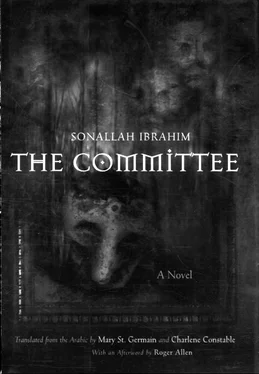A year of so after this, circumstances took me to Baghdad. I had set out with an Iraqi friend through the quiet streets near the city center when I noticed a twostory house across the street, surrounded by a small garden. It was guarded by a number of soldiers wearing camouflage uniforms and armed with automatic weapons. I asked my friend about its owner. He scolded me in a faint voice, looking at the ground, "Look straight ahead, not over there!" I did as he asked and when we were out of range he said to me, "Do you want to do us in? That's the Doctor's house!" I didn't dare pump him at that moment, but I still didn't know whether he meant my well-known countryman or another person, an Iraqi, who contended with him for the title.
Seriously considering this now, I see that it makes no difference whether it's one or the other. Having a rival in every Arab capital doesn't detract from my countryman. On the contrary, this rivalry brings to mind other simi larities, if in fact this isn't just one person, and confirms once again the importance of this man and his affairs.
Perhaps you have noticed my interest in this matter. Once I had seen the connections between these memories and impressions, I became increasingly convinced that I had finally found exactly what I had been searching for. The Doctor might not be as well known as the singers or dancers, but he is certainly more powerful and influential than they are, not only within my country but throughout the whole Arab world. Clearly he very much has a hand in shaping the present and the future. How can there be anyone more illustrious than that?
I took matters in hand and made him the subject of the requested study.
I devised a brilliant plan, which was, in short, to read everything written on him: studies and newspaper and magazine articles. Then I would interview him. I would ask a number of clever questions carefully phrased so as to fill the gaps in my reading and complete his personality profile. I intended to describe him accurately and precisely.
I was forced to amend my plan when I couldn't find a single book about him. Apparently no one else had noticed his importance, or found him a gripping subject, or perhaps writers were waiting for his death so his biography would be complete.
As happy as I was to broach a subject no one had dealt with, I knew the difficulties that would result. So I decided to start by interviewing him. He might point out an article that had eluded me, or perhaps might not object if I examined whatever personal papers he might have.
I put on my best clothes and took my Samsonite briefcase. Inside it were a small Japanese tape recorder, a new notebook, some pens, and a slip of paper with the main points I wanted to raise with him.
I hurried to one of the foundations linked with his name, having obtained its address from the phone books. At the information desk I learned that the Doctor didn't keep a regular schedule. When I explained I urgently needed to meet with him, naturally without revealing the real reason, the clerk searched my briefcase for weapons and explosives, then referred me to one of the secretaries.
The secretary gave me the cold shoulder. She told me in no uncertain terms that I wouldn't be able to interview the Doctor in the near future. In the first place, he rarely comes to his office because he constantly shuttles between the Arab capitals on business. Second, there is a long list of people waiting for appointments. Third, I would have to explain my request in full, flawlessly written, so she could forward it to the office manager. I learned from her that he was one of those well-known university professors who had been in the limelight during the '60s and whose names were linked with ambitious projects for heavy industrialization.
I was completely at a loss. I couldn't mention my connection with the Committee. In spite of its importance and the extent of its authority, from an official standpoint it didn't exist. Any attempt to link my request with it would be received with surprise and scorn. While it was possible to bring up the subject with the Doctor himself, it was impossible to allude to it in a memo.he secretary would bring to the office manager's attention. If I were to omit the Committee's role, what other reason could I give? "An unknown amateur writer seeks to write a book about your eminence." What would assure him that I was not just some deceitful imposter trying to get a foot in the door to ask for a job or charity?
I lef_, depressed, to study the matter. Time seemed to fly by without my getting anywhere. Trying to get an appointment with the Doctor could take days or maybe weeks, and might in the end come to nothing. Because of this. I altered my plan a second time and decided to put my nose to the grindstone immediately by beginning tD collect everything published about him in the newspapers.
I went along to the huge building that houses the offices of the most important and widely circulated daily newspaper. Since I considered an appropriate point for tracing the Doctor's eventful career to be twenty-five years ago, I asked to see the issues published from that date.
I sat at one of the tables in the reading room and took an empty notebook and a pen out of my briefcase. Meanwhile, the attendant brought me several dust-covered volumes of the newspaper. I picked up the first volume, opened the cover, and began to turn the pages.
I plunged at once into a strange world that came alive in my mind: exciting events, famous men and women, and their boundless ambitions. The images of the past absorbed me, until, with difficulty, I tore my eyes away from the dusty pages and reminded myself of my goal. I turned the next pages slowly and unwillingly. I was like someone recalling his childhood and youth, who despairs when reflecting on the hopes and dreams that had once beguiled him, especially considering how things had turned out.
I got dizzy from turning the pages, shifting my eyes between the headlines and the pictures and inhaling the dust. I realized the enormity of the task I had imposed on myself when, after three hours, I hadn't examined more than ten issues. A familiar sinking feeling came over me. I craved a cup of coffee or a glass of beer, but I couldn't muster enough energy to order anything from the tea boy who peered in regularly to check for customers.
The attendant settled the matter by informing me that it was closing time. I sighed in relief, returned my papers to my briefcase, having written nothing, then picked up my briefcase and left the reading room.
I calculated that if I read the issues I wanted from just this newspaper, there would be 265 x 25 years = 9125 issues. If I worked a normal shift every day without interruption, and without falling ill, or being stuck in traffic, or having the electricity or water go off, or other typical surprises, I would need about one thousand days. That would be three years for just one newspaper.
I couldn't bring myself to rely entirely on one newspaper. Although the national newspapers constantly print the same news and commentary, and even the same pictures, the social and entertainment sections have some diversity. I pinned my hopes on these sections. After all, since he wasn't a political figure or movie star, news about the Doctor wouldn't be in the front-page section.
There were also weekly and monthly magazines as well as the newspapers and magazines published in the East and West. All this means, to be honest with myself, that I would need to be completely free to devote at least three or four years just to gather the material. Then there would be the time required to study and analyze it and draw conclusions.
I wasn't apprehensive about being absent from my real job, since the Committee arranges a paid leave of absence for its interviewees until their cases are finished. However, I was ignorant of the period allotted for the study and consequently I couldn't afford to commit myself to such a time-consuming methodology.
Читать дальше











